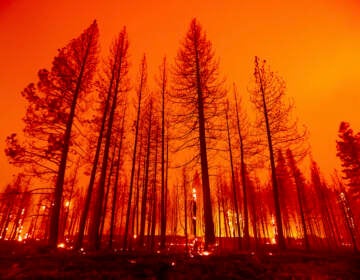Pa. won’t hit climate goals without increasing efforts now, report says
The Wolf Administration says a new plan can help the commonwealth reach its greenhouse gas reduction goals by 2050 and help avoid the worst effects of climate change.

Vehicles are under water during flooding in Norristown, Pa. Thursday, Sept. 2, 2021 in the aftermath of downpours and high winds from the remnants of Hurricane Ida that hit the area. Scientists say climate change is contributing to the strength of storms like Ida. (Matt Rourke/AP Photo)
This story originally appeared on StateImpact Pennsylvania.
The Wolf Administration says a new plan can help the commonwealth reach its greenhouse gas reduction goals by 2050 and help avoid the worst effects of climate change.
Gov. Tom Wolf is pushing to cut the state’s emissions 80 percent by 2050, compared to 2005 levels.
Emissions have already fallen nearly 20 percent, but the 2021 Climate Action Plan says the state won’t meet the longer term goal without new efforts in the next decade.
The new plan focuses on cutting emissions in the state’s three most-polluting sectors: electricity generation, industrial energy use, and transportation.
Department of Transportation Secretary Yassmin Gramian said her agency is already considering extreme weather risks in its maintenance and design plans.
“Because we know that we are already experiencing the effects of climate change, we need to proactively work to adapt to this new reality,” she said.
Gramian said flooding in 2018 caused nearly $126 million in damage to state roads and bridges — the highest cost for a single year in the last decade.
The Climate Action Plan outlines 18 strategies to reduce emissions across sectors. They include creating an emissions-free electric grid and encouraging people to buy electric cars.
Agriculture Secretary Russell Redding said farmers feel the pressures of unpredictable weather, invasive species, and environmental stewardship.
“All of that comes together in this discussion of climate and is exacerbated by the extremes,” Redding said.
For agriculture, the plan’s recommendations include educating farmers on best practices to increase energy efficiency and trap carbon emissions in plants.
The Wolf Administration said the measures will help to avoid the worst effects of climate change on public health and safety, infrastructure, agriculture and recreation.
The plan attracted criticism for both its suggestions and what it left out.
Patrick Henderson, who serves on the Department of Environmental Protection’s Climate Change Advisory Committee, said in written comments that the plan “fails to include tangible and specific benefits that Pennsylvanians will see should these recommendations be implemented.”
He said DEP also neglected to evaluate whether the recommendations will contribute to a net reduction of global emissions.
Henderson works for the Marcellus Shale Coalition, but he was appointed to the committee as a private citizen and not as a representative of his employer.
DEP Secretary Patrick McDonnell said it’s true that Pennsylvania can’t solve the climate crisis alone. But, acknowledging the state’s historic energy role, he said, “The rest of the world will not stop it without us.”
Joe Minott, Clean Air Council executive director, said the plan should put more of a priority on the potent greenhouse gas methane, especially when it leaks from low-producing oil and gas wells.
“Low producing wells contribute to half of PA’s methane emissions from oil and gas facilities and are currently exempted from PA’s upcoming rule to reduce methane pollution from the gas industry,” Minott said in a statement.

Get daily updates from WHYY News!
WHYY is your source for fact-based, in-depth journalism and information. As a nonprofit organization, we rely on financial support from readers like you. Please give today.






